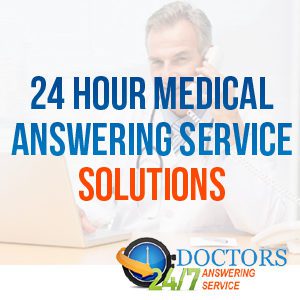
Taking a Break: Let Medical Answering Services Carry the Load
In today’s fast-paced world of medicine, the well-being of the very professionals who tend to our health often takes a backseat. As calls keep coming, appointments keep piling up, and patients’ concerns never seem to end, the healthcare providers bear the brunt. But what if there were a way to ensure seamless patient interaction while also allowing our dedicated doctors and nurses a moment to breathe? Enter medical answering services, the unsung heroes that carry the hefty communication load, enabling medical professionals to take that much-needed break.

The Heavy Weight of Continuous Communication
Before we delve into the solutions, it’s vital to understand the depth of the problem. A significant portion of a healthcare provider’s day is devoted to administrative tasks and answering non-emergency calls. Such seemingly mundane tasks not only consume valuable time but also add to the stress and potential burnout of these professionals. As the day stretches and fatigue sets in, maintaining the same level of patience and compassion in each call becomes challenging.
Answering Services to the Rescue
A medical answering service is more than just a call center. It’s a specialized service equipped to handle the intricacies and sensitivities of medical communications. Here’s how they act as a balm to the overworked medical community:
- Triage Calls: Not every call that comes into a medical office is an emergency. Medical answering services are adept at triaging calls, ensuring that genuine emergencies are escalated while routine inquiries are addressed without disturbing the physicians.
- 24/7 Service: Illnesses and worries don’t follow business hours. With a dedicated answering service, patients can reach out any time, ensuring they feel heard and cared for, while medical professionals aren’t perpetually on call.
- Bilingual Support: As our communities become more diverse, the need for multilingual support is paramount. Top-tier answering services offer assistance in multiple languages, bridging the communication gap.

Benefits Beyond the Break
While the primary advantage is the immediate relief these services provide to overburdened professionals, the benefits extend beyond just ‘taking a break.’
- Enhanced Patient Satisfaction: When patients feel heard and attended to promptly, their trust and satisfaction with the healthcare system naturally increase.
- Error Reduction: Fatigue and continuous work can lead to mistakes. By diverting a portion of the load to trained professionals, the margin for error in communication reduces.
- Cost-Effective: Hiring full-time staff to manage calls might seem like an alternative. However, the cost-effectiveness and efficiency of specialized medical answering services make them a superior choice.
Incorporating the Change
For medical facilities looking to integrate answering services, the transition is generally smooth. Most services offer a blend of automated and human-operated systems, ensuring a personal touch without compromising efficiency. Training is provided based on the specific needs of the institution, making the changeover seamless for patients and professionals alike.
As the demands of the modern world weigh heavily on our healthcare providers, medical answering services emerge as a beacon of relief. By ensuring that communication remains unbroken, yet not overburdening our frontline workers, these services strike a balance between care and convenience. For a world that’s continuously ringing, sometimes the best answer is to let someone else pick up the phone.

Call Volume Capacity of Medical Answering Services: A Boost to Your Practice’s Bottom Line
Handling a high volume of incoming calls efficiently is not just a convenience; it’s a necessity for medical practices in this modern age. Medical answering services have the infrastructure, technology, and expertise to manage large call volumes effectively, ensuring that every patient’s concern is addressed promptly. By outsourcing the task of handling incoming calls to these services, medical practices can enjoy several financial and operational advantages.
Understanding the Call Volume Medical Answering Services Can Handle
Medical answering services are designed to manage hundreds, if not thousands, of calls simultaneously. Thanks to advanced technologies, these services can efficiently triage, redirect, and manage every call that comes their way. Some of the features they utilize include:
- Automated Call Distribution: This system ensures that incoming calls are directed to the next available agent, reducing wait times.
- Queue Management: Even during peak times, this system manages calls effectively, ensuring that no caller is left unattended.
- Cloud-based Infrastructure: This allows for scalability. So, during particularly busy times like flu season or health outbreaks, the service can handle the uptick in call volume.

Impact on Your Practice’s Bottom Line
The efficient management of call volume has a direct correlation with a practice’s profitability and operational efficiency. Here’s how:
- Reduced Operational Costs: Hiring, training, and maintaining in-house staff to manage high call volumes can be expensive. Outsourcing to an answering service reduces overheads associated with full-time salaries, benefits, and infrastructure.
- Increase in Revenue: Missed calls often equate to missed appointments or potential new patients. By ensuring every call is answered, medical practices can increase appointment bookings, thus boosting revenue.
- Enhanced Patient Retention: Patients appreciate prompt responses. With reduced wait times and efficient call handling, patient satisfaction increases, making them more likely to stick with your practice and even provide referrals.
- Efficient Resource Allocation: Freed from the continuous stream of incoming calls, your in-house staff can focus on in-person patient care, administrative tasks, and other crucial duties that can improve the clinic’s operations and service quality.
An Investment Worth Making
While there’s an associated cost with hiring a medical answering service, the return on investment, both in terms of financial gains and improved patient relations, is substantial. Medical practices can reallocate resources, optimize operations, and ultimately enhance the patient experience.
By handling high call volumes effectively and efficiently, medical answering services not only relieve healthcare professionals of added stress but also pave the way for a more prosperous and patient-centric practice. When considering the long-term health of a medical business, the decision to incorporate a medical answering service becomes not just a choice but a strategic necessity.

How Much Do Medical Answering Services Cost?
Investing in a medical answering service is not only about enhancing your practice’s efficiency but also about providing an optimal patient experience. However, just like any business decision, it’s essential to consider the financial implications. Let’s delve into the average cost of medical answering services and what factors influence these costs.
Average Cost of Medical Answering Services
The cost of medical answering services can vary widely based on several factors. On average, a medical practice might expect to pay anywhere from $0.70 to $1.50 per minute. Most services operate on a monthly subscription model, with many offering tiered packages based on the number of minutes or calls you anticipate needing. For a small to medium-sized clinic, the monthly cost can range from $50 for minimal usage to $1,500 for high volume practices.

Factors Influencing the Cost
- Volume of Calls: The most significant determinant of cost is the number of calls or minutes your practice requires. Higher call volumes typically lead to higher monthly charges.
- Level of Service: Answering services can range from basic message-taking to comprehensive services that include appointment scheduling, emergency call routing, prescription refill requests, and more. The more extensive and specialized the service, the higher the cost.
- Specialized Training: If the service provides agents with medical training or specific knowledge about your practice, this can also increase costs.
- Technology and Integration: Advanced services may offer integration with your current patient management systems, HIPAA-compliant messaging, or other technological features. While these can enhance the patient experience and streamline processes, they might also come at a premium.
- Contractual Commitment: Some services might offer discounts for longer-term commitments or for paying several months in advance.
- After-Hours or 24/7 Service: If you require the answering service to be available outside of regular business hours or around the clock, this can influence the cost.
Assessing the Value
While understanding the average costs and the factors influencing them is vital, it’s equally essential to measure the value that these services provide. A medical answering service might seem like an additional expense, but it’s essential to consider the potential return on investment. The service can enhance patient retention, reduce no-shows, decrease staff workload, and even boost the overall reputation of your practice.

When assessing the cost, weigh it against these tangible and intangible benefits. The peace of mind knowing each call is professionally handled, and no opportunity is missed can be invaluable to a thriving medical practice in today’s competitive landscape.

The Importance of HIPAA Compliance When Choosing a Medical Answering Service
In the world of medical practice, patient privacy isn’t just a courtesy; it’s the law. The Health Insurance Portability and Accountability Act, better known as HIPAA, sets the standard for protecting sensitive patient data. Any company that deals with protected health information (PHI) must ensure all the required physical, network, and process security measures are in place and followed.
Understanding HIPAA
HIPAA was enacted in 1996 to ensure that personal health information would remain confidential. It provides patients with significant rights regarding their health information, including rights to examine and obtain a copy of their health records, and to request corrections. But how does it relate to a medical answering service?
Medical answering services, just like other third-party vendors that may handle PHI, are considered ‘business associates’ under HIPAA. This means they have specific responsibilities they must uphold to ensure the data’s privacy and security.
Why HIPAA Compliance Matters in an Answering Service
- Protecting Patient Privacy: Patients trust medical professionals with their most intimate details, from medical history to personal contact information. An answering service that is not HIPAA compliant can inadvertently breach this trust, leading to significant harm to patients and potential legal action.
- Avoiding Hefty Fines: Non-compliance can result in severe penalties for practices. Fines can range from $100 to $50,000 per violation, with a maximum annual penalty of $1.5 million. This isn’t even accounting for the damage done to a practice’s reputation in the case of a privacy violation.
- Building Trust: For many patients, the assurance that their data is being handled with care and discretion is paramount. Knowing that your practice prioritizes this not only satisfies legal standards but can also foster trust and loyalty among your patient base.
- Ensuring Smooth Operations: HIPAA compliant answering services will have measures in place to handle situations that might lead to data breaches. Their expertise ensures that even in complex scenarios, patient data remains protected.
Evaluating HIPAA Compliance
When considering a medical answering service, it’s essential to evaluate their HIPAA compliance thoroughly. Some key questions to ask include:
- Do they offer encrypted communication channels?
- Are their employees trained regularly on HIPAA regulations and the importance of patient privacy?
- Is there a dedicated compliance officer or team?
- Can they provide evidence of risk assessments and how they mitigate potential breaches?
- Do they have case studies or examples demonstrating their commitment to data protection?

While there are various factors to weigh when choosing a medical answering service, HIPAA compliance stands out as one of the most crucial. Prioritizing this not only safeguards your practice against legal repercussions but also ensures that your patients’ trust is never compromised.

Tailoring Services to Your Practice’s Needs
As with any service integration, one size rarely fits all. Each medical practice, from family care clinics to specialized surgical centers, has distinct operational nuances. An ideal medical answering service will seamlessly integrate with your practice, reflecting your office’s professionalism, culture, and patient care standards. Here’s why tailored services are a pivotal element when considering an answering service:
Understanding Practice Specialties
Different specialties often have distinct requirements. For instance, a pediatrician’s office might receive urgent calls about high fevers in the middle of the night, while a dermatologist’s office might get inquiries about post-procedure care. An effective answering service will be prepared to handle the unique and diverse queries each specialty might encounter.
Addressing Volume Needs
The size and call volume of your practice play a critical role. A smaller clinic might only need after-hours answering services, while a larger practice might require round-the-clock assistance due to a higher influx of calls. It’s imperative for the answering service to be scalable to accommodate both growing practices and those with fluctuating call volumes.
Multilingual Support
In a culturally diverse state like Georgia, practices may cater to a patient base with varied linguistic needs. Having multilingual support ensures that all patients, regardless of their primary language, can access the necessary care and information without communication barriers.
Customizable Call Scripts
Every practice has its own approach to patient care, and this should extend to telephone interactions as well. Many premium answering services offer customizable call scripts. This ensures that each call reflects your practice’s ethos, maintaining a consistent patient experience whether they’re speaking directly with your office staff or the answering service.
Technology Integration
Medical practices often use specialized software for appointment scheduling, electronic health records, and billing. The ideal medical answering service should seamlessly integrate with these systems, ensuring a cohesive workflow and minimizing the administrative load on in-house staff.

While the broad benefits of a medical answering service are clear, the nuances in its application make all the difference. By ensuring that the service is tailored to fit the unique needs and challenges of your medical practice, you ensure not only operational efficiency but also an enhanced patient experience – a critical metric in today’s patient-centric healthcare landscape.

The Top 10 Medical Answering Services in 2023
Finding the right medical answering service that aligns with your practice’s ethos and needs can be a daunting task. To aid in this endeavor, here’s a list of the top 10 medical answering services in 2023:
- MediConnect: Recognized for its impeccable patient interaction standards, MediConnect offers 24/7 services and boasts seamless integration with various medical software platforms.
- HealthLine Response: Specializing in large practices and hospitals, HealthLine provides multilingual support and comprehensive after-hours solutions.
- CareCall Associates: With its team of highly-trained call agents, CareCall ensures that patient inquiries are handled with utmost empathy and precision.
- DocSupport: Renowned for its customizable call scripts and technological adeptness, DocSupport offers scalability for both small clinics and large medical centers.
- MediAssist Solutions: Particularly suitable for specialized practices, MediAssist has a robust knowledge base that spans across various medical fields.
- CliniCall: This service is known for its flexibility, offering both full-time answering support and after-hours solutions based on a practice’s unique requirements.
- PulsePoint Communications: With a focus on efficient and HIPAA-compliant communications, PulsePoint offers integrative solutions tailored for modern medical practices.
- MedEcho: With its core strength being multilingual support, MedEcho caters to culturally diverse patient bases, ensuring language is never a barrier in delivering care.
- CuraLine: Taking a tech-forward approach, CuraLine’s systems can be effortlessly integrated with most EHR platforms, making it a favorite among technologically advanced practices.
- HealthFirst Callings: With a strong emphasis on training, HealthFirst ensures that all call agents are well-versed with the medical terminologies and procedures relevant to your practice.
Choosing among these top-tier services primarily depends on your practice’s size, patient demographics, technological infrastructure, and specific operational needs. Engaging in direct consultation with a few of these services, understanding their pricing models, and evaluating their fitment can go a long way in enhancing the patient experience and ensuring operational continuity.

Comparing a Full-time Medical Receptionist to a 24/7 Medical Answering Service
When it comes to managing patient calls and scheduling appointments, medical practices often face the decision of hiring a full-time receptionist or outsourcing to a 24/7 medical answering service. Let’s dive into the key differences, pros, and cons of each to make a more informed decision for your practice.

Full-time Medical Receptionist
Advantages:
- Personal Touch: A receptionist familiar with your patients provides a personal touch. They may recognize frequent callers and understand their specific needs.
- On-Site Assistance: Being physically present, they can assist with in-person patient needs, manage walk-ins, and ensure seamless coordination with medical staff.
- Immediate Problem Solving: If there’s an immediate issue, an in-house receptionist can usually address it promptly.
Disadvantages:
- Limited Availability: They typically work set hours, leaving gaps during after-hours, weekends, and holidays.
- Overhead Costs: Apart from the salary, there are additional costs like benefits, leaves, training, and potential turnover.
- Capacity Constraints: During peak call times, patients might be placed on hold, leading to potential dissatisfaction.
24/7 Medical Answering Service
Advantages:
- Round-the-Clock Coverage: They offer continuous coverage, ensuring no patient call goes unanswered, even during off-hours.
- Scalability: Can handle a large volume of calls simultaneously, reducing patient wait time.
- Specialized Training: Call agents are usually trained to manage medical queries, ensuring professionalism and compliance.
- Cost-Effective: Typically, you’d pay for the service and not the additional overheads associated with full-time employees.
- Data Management: Advanced services often provide call analytics, helping practices improve their patient care based on data.
Disadvantages:
- Less Personal: Might not offer the same level of personal recognition and rapport that an in-house receptionist might provide.
- Reliance on Third Parties: There’s a dependency on an external entity, which might not always align with your practice’s immediate requirements.
- Integration Challenges: Some services might not seamlessly integrate with your existing patient management systems, causing potential hiccups.

The choice between a full-time receptionist and a 24/7 answering service depends on the specific needs and priorities of a medical practice. For smaller practices or those that value a high degree of personal touch, a full-time receptionist might be ideal. On the other hand, practices that receive a high volume of calls or want consistent after-hours coverage might find greater value in a medical answering service.
It’s essential to evaluate both options carefully, considering costs, patient experience, and operational efficiency, before making a final decision.
Utilizing Technology: The Synergy between Medical Answering Services and Practice Management Software
In the modern medical world, integrating technology into your practice is more than a luxury—it’s essential for operational efficiency and providing optimal patient care. One such avenue that many practices are exploring is the combination of medical answering services with advanced practice management software.

The Integrated Approach
When a medical answering service is seamlessly integrated into your practice management system, it brings about several advantages:
- Instant Access to Patient Data: Call agents can access relevant patient information in real-time, ensuring more accurate and tailored interactions.
- Automatic Scheduling: Appointments can be scheduled directly into the system, reducing the risk of double bookings or scheduling errors.
- Real-time Updates: Any changes or notes made during the call, like prescription refill requests or symptom descriptions, are instantly updated in the system.
- Enhanced Data Security: Integrating with trusted software ensures that patient data is treated with the utmost confidentiality, adhering to all security standards.
Streamlined Workflow
A well-integrated system means reduced manual entries, fewer errors, and a more streamlined workflow. For instance:
- Call Prioritization: The system can be set to prioritize calls based on the nature of the inquiry or the patient’s medical history.
- Follow-up Reminders: Automatic reminders can be set for patients, ensuring they never miss appointments or important health check-ups.
- Billing and Payment: Some advanced answering services can even handle billing inquiries, directing patients on how to pay online or addressing common questions about insurance.
Enhancing Patient Experience
The combination of an answering service with practice management software can also significantly enhance the patient experience:
- Reduced Wait Times: Immediate access to patient data means faster call handling.
- Personalized Interactions: Call agents have all the relevant patient information at their fingertips, making interactions feel more personalized.
- Consistent Communication: With 24/7 coverage and real-time updates, patients feel consistently heard and attended to, regardless of when they call.
Embracing technology and integrating your medical answering service with your practice management software can propel your medical practice into the future. It not only brings about operational efficiencies but also significantly elevates the patient experience. As the medical world continues to evolve, staying ahead of the curve by utilizing such synergies can set your practice apart and ensure long-term growth and success.

